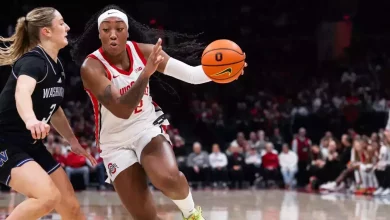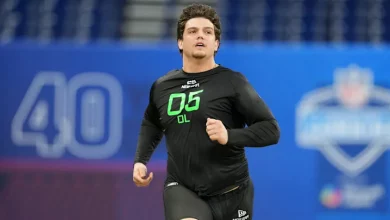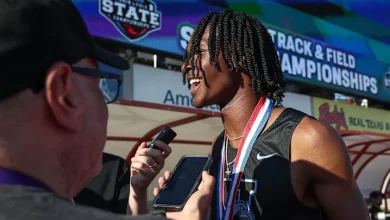Former Georgia standouts Mykel Williams and Jalon Walker are poised for big rookie seasons, ranked third among 2025 Defensive Rookie of the Year candidates entering the NFL.

In the ever-competitive landscape of the National Football League, each new draft class offers a fresh infusion of talent and promise. Among the most heralded newcomers for the 2025 season are former University of Georgia defensive standouts Mykel Williams and Jalon Walker. With both players ranked third in odds among 2025 Defensive Rookie of the Year candidates, expectations are sky-high. Their collegiate performances, physical tools, and football IQ make them prime candidates to make an immediate impact. As they transition to the professional stage, both are not only poised for success—they’re prepared to lead.
Georgia’s Defensive Factory
The University of Georgia under head coach Kirby Smart has become synonymous with defensive excellence. Since Smart took over in 2016, the Bulldogs have consistently churned out elite defensive prospects, many of whom have gone on to become immediate contributors in the NFL. From Roquan Smith to Jordan Davis and Nakobe Dean, Georgia defenders are becoming staples on NFL rosters—and now Mykel Williams and Jalon Walker look to carry that torch.
Their time in Athens saw them grow from promising recruits into dominant forces. Though they arrived in different recruiting cycles, their rise was parallel—marked by explosive athleticism, elite instincts, and a work ethic that defined the Georgia defense.
Mykel Williams: A Relentless Edge Presence
Mykel Williams entered the University of Georgia as one of the most sought-after recruits in the country, rated as a five-star prospect and the top edge rusher in the 2022 class. Standing 6’5″ and weighing around 265 pounds, Williams brings an NFL-ready frame that combines power, quickness, and a technician’s understanding of pass rushing. His length and hand usage stood out from day one.
By his sophomore and junior seasons, Williams had developed into one of the premier edge defenders in college football. He routinely faced double teams but still produced at a high level, recording sacks, tackles for loss, and quarterback pressures that disrupted offensive game plans. His performance in key games—particularly against SEC rivals and in the College Football Playoff—cemented his reputation as a game-changer.
What separates Williams is his ability to convert speed to power. He’s not just a pass-rusher who relies on athleticism—his understanding of leverage, hand placement, and timing makes him a nightmare for offensive tackles. He’s also a disciplined edge setter against the run, showing an ability to stack and shed, maintain outside contain, and close gaps with urgency.
Drafted in the top 15 by a team in desperate need of pass-rushing help, Williams enters a situation tailor-made for an impact rookie season. Paired with a veteran interior presence and playing in a scheme that allows him to attack upfield, Williams is expected to start from day one. He brings Pro Bowl-level potential and could be a double-digit sack threat as early as his first season.
Jalon Walker: Versatility and Violence at Linebacker
If Mykel Williams is a force off the edge, Jalon Walker is the type of versatile linebacker modern NFL defenses covet. At Georgia, Walker played both inside and outside linebacker, showcasing range, blitzing ability, and coverage skills that allowed him to affect all three levels of the field. A former five-star recruit himself, Walker’s rare combination of speed, strength, and football intelligence made him a cornerstone of the Georgia defense.
Standing at 6’2” and 240 pounds with elite sideline-to-sideline speed, Walker is the prototype for the hybrid linebacker/edge role that has become popular in both college and pro systems. His background as a pass rusher gives him a natural feel when blitzing, but what makes him special is his ability to drop into coverage and mirror tight ends and running backs.
Walker’s 2024 college season was his breakout. He led Georgia in tackles, logged multiple sacks, and had several pass breakups, including an interception in the SEC Championship game. His instincts flashed constantly on film—whether reading run plays, diagnosing screen passes, or knifing into the backfield on delayed blitzes.
Walker was drafted later in the first round than his teammate Williams, but his fit is just as impactful. He joins a team that plans to use him as a “chess piece” defender—playing weakside linebacker on early downs and moving into a hybrid role on third downs. His adaptability could result in a high snap count and big-play production, the kind that catches the eyes of awards voters.
The Defensive Rookie of the Year Race
The Defensive Rookie of the Year (DROY) award has historically gone to players who either dominate the stat sheet—especially in sacks or interceptions—or become the anchor of their unit. Williams and Walker bring different paths to candidacy, but both check important boxes.
Williams is likely to compile stats that voters love—sacks, forced fumbles, and tackles for loss. If he’s able to consistently pressure quarterbacks and produce splash plays, he will remain in the DROY conversation all season long. A rookie who gets 8+ sacks, particularly on a team that shows defensive improvement, tends to attract serious consideration.
Walker, on the other hand, brings value in versatility. While linebackers don’t always accumulate stats in bunches like edge rushers, Walker’s ability to rack up tackles, defend passes, and force turnovers gives him a well-rounded portfolio. His game film may end up being more impressive than his stat line, but if he can notch a few interceptions or defensive touchdowns, he could tip the scale in his favor.
Fit Matters: Landing in the Right Situation
Success as a rookie often hinges on more than just talent—it depends heavily on scheme fit, coaching, and opportunity. Fortunately, both players landed in systems that align with their strengths.
Williams steps into a 4-3 scheme that emphasizes aggressive, attacking defensive ends. With a veteran presence on the interior and a secondary that can hold coverage, Williams will have opportunities to win one-on-one matchups. His defensive coordinator has a strong track record of developing young pass rushers, giving him the mentorship and system he needs to thrive.
Walker’s new team runs a multiple-front defense that uses hybrid players to disguise coverages and confuse quarterbacks. In short, it’s the perfect place for a player with Walker’s flexibility. His ability to play all three linebacker spots, blitz from different angles, and cover tight ends allows the defense to stay unpredictable. Coaches have already raved about his football IQ and leadership, suggesting he could wear the green dot helmet sooner rather than later.
Intangibles and Leadership
Beyond their physical abilities, what truly sets Williams and Walker apart is their approach to the game. Both were team captains at Georgia, praised by coaches and teammates for their maturity, work ethic, and ability to lead by example.
Williams is known for his meticulous film study and attention to detail. Teammates often commented that he was always the first in the building and the last to leave. His commitment to mastering his craft is evident in his polished technique and on-field discipline.
Walker, meanwhile, has a magnetic presence in the locker room. His energy, vocal leadership, and passion for the game inspire those around him. At Georgia, he was the emotional leader of the defense—always the first to celebrate with teammates and the one rallying the unit after a tough drive. Those traits will serve him well in the NFL, where leadership is just as crucial as physical ability.
Legacy of Georgia Defenders in the NFL
Both Williams and Walker enter the NFL as part of a growing legacy of Georgia defenders making waves at the next level. Players like Travon Walker, Quay Walker, Devonte Wyatt, and Lewis Cine have all made headlines after leaving Athens. NFL teams are taking notice—Georgia is no longer just a top-tier college program; it’s a defensive pipeline.
That reputation adds a layer of expectation. Williams and Walker are not just representing themselves—they’re representing a system, a coaching staff, and a culture that has become synonymous with defensive excellence. They know what it takes to win, to play under pressure, and to perform on the biggest stages.
Outlook for the 2025 Season
With training camps approaching, all eyes will be on how Williams and Walker adjust to the speed of the NFL. Early reports from minicamps are positive, with both players showing the kind of explosiveness and discipline that made them college stars.
If they stay healthy, both are primed to be starters and central figures in their respective defenses. Williams will be tasked with disrupting the passing game, while Walker will be called on to quarterback the defense and make plays all over the field. They won’t just contribute—they’re expected to lead.
The Defensive Rookie of the Year race is wide open, but it would surprise no one if two former Georgia Bulldogs finish near the top. In a league driven by impact defenders, Mykel Williams and Jalon Walker have all the tools—and the mindset—to be special.









